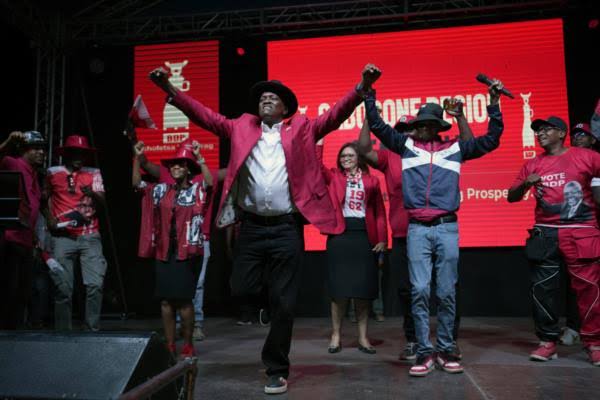Gaborone, Botswana – Botswana’s citizens took to the polls on Wednesday in a pivotal election that will determine if President Mokgweetsi Masisi and his ruling Botswana Democratic Party (BDP) can continue their nearly 60-year grip on power. The election comes amid mounting concerns over high unemployment rates, economic inequality, and a slowing economy in this diamond-rich nation. With one million registered voters and a reputation as one of southern Africa’s most stable democracies, Botswana’s election is being closely watched.
Long lines began forming early, with some voters arriving hours before polls opened. Lone Kobe, a 38-year-old self-employed citizen, was among those waiting eagerly. “It is my time to voice my opinion,” Kobe said, explaining her hope for systemic change in a government she feels has historically benefited only a small segment of the population. “We are just spectators, like we are watching a movie,” she added, expressing frustration with a perceived lack of economic opportunities for ordinary citizens.
Since gaining independence from Britain in 1966, Botswana has transformed itself from one of the world’s poorest nations to a success story in Africa, thanks largely to its diamond reserves. However, in recent years, economic growth has slowed, and unemployment has surged to 27 percent, with youth unemployment being particularly high. Additionally, a 2022 World Bank report highlighted that Botswana ranks as one of the most unequal countries globally, with the richest 10 percent holding a vast majority of the country’s wealth.
President Masisi, who is US-educated and came into power in 2019, has faced criticism over rising unemployment and a struggling economy. His administration has also been dogged by allegations of corruption and nepotism, issues that have led to widespread public dissatisfaction.
Also, read; South African Government to Revoke Chidimma’s ID Documents Amid Nationality Dispute
As Masisi cast his vote in Moshupa, his home village about 60 kilometers west of the capital, Gaborone, he addressed the economic concerns head-on. He acknowledged the country’s declining foreign reserves and a slump in international diamond sales, but vowed to boost local investment as a remedy. “We intend to address that by putting money into the pockets of citizens and building infrastructure,” he stated.
For the BDP, this election marks a potential turning point, as there is speculation that Botswana may experience a hung parliament for the first time. Despite this, Masisi remained optimistic, telling reporters, “I don’t want a hung parliament. But if that happens, parties will have to negotiate.” Masisi went on to express confidence to observers from Zimbabwe’s ruling party, stating that “victory is certain.”
Not everyone shares Masisi’s optimism for change, however. For 57-year-old Mompati Seekano, who is currently unemployed, the BDP’s legacy of growth and development still resonates. “The BDP government has done great things for this country. President Masisi should be granted a second term,” he said, emphasizing loyalty to the party that has historically driven Botswana’s prosperity.
As the nation waits for results, anticipated late Thursday, this election could mark a significant shift in Botswana’s political landscape. With a new generation of voters focused on issues of equity, job creation, and economic reform, the outcome will set the tone for the country’s future direction.

